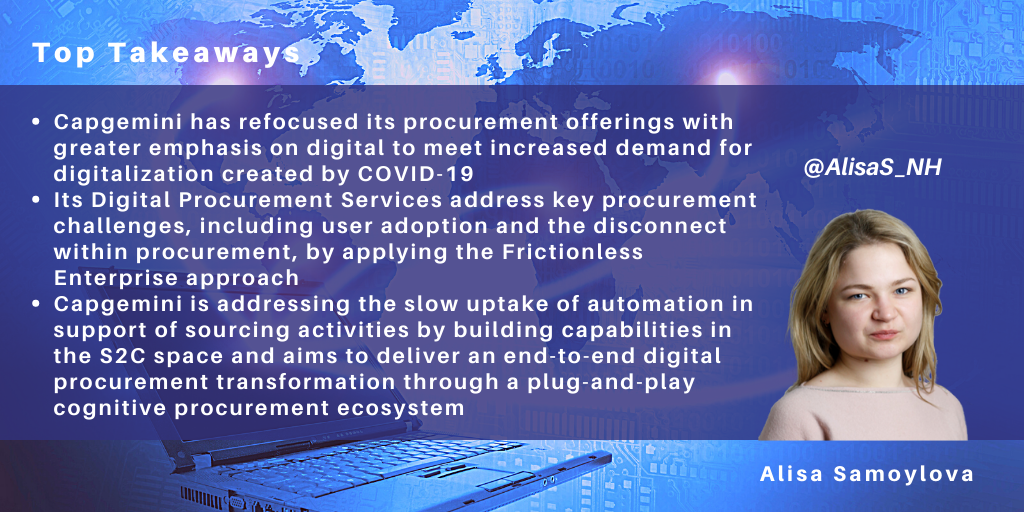Search posts by keywords:
Filter posts by author:
Related NEAT Reports
Other blog posts
posted on Jun 01, 2021 by NelsonHall Analyst

One of the impacts of the pandemic has been a broad acceleration in enterprise digitalization initiatives, and organizations are looking for strategic partners to assist them in their digital transformation journeys. While digitalization is now top of mind even in procurement, historically there have been challenges in applying intelligent automation to procurement, including budget constraints, poor process alignment, incompatible technology, a lack of perceived need, and resistance to change (see here).
COVID-19 has helped drive acceptance of major changes in working practices and increased awareness of the need to free up skilled procurement resources to focus on strategic tasks. Against this background, Capgemini has refocused its procurement offerings in line with its Frictionless Enterprise approach, emphasizing digital.
Addressing the resistance to change
Capgemini’s Digital Procurement Services offering aims to address user adoption by focusing on the user experience. Its Frictionless Enterprise approach places importance on the digitally augmented workforce (see here). Capgemini’s digital procurement services focus on continually supporting end-users, ensuring adoption, supplier engagement (particularly during the onboarding process), and driving catalog content. In addition, Capgemini looks to apply design thinking and customer journey mapping capabilities to the UX in the procurement process, leveraging its expertise in user experience design with recent investments by Capgemini’s consulting group, including Frog Design.
Addressing the disconnect within procurement
With its Frictionless Enterprise approach, Capgemini looks to address any friction points between departments, functions, applications, data sources, devices, etc. As part of its digital procurement offering, Capgemini uses the concepts of Frictionless Enterprise to:
- Determine the objectives of the procurement transformation and align with the overall strategy for the function
- Assess opportunities for channel, spend, and working capital optimization
- Develop and deploy a frictionless operation model through the use of technology and analytics
- Deliver the operating model by leveraging Capgemini’s nearshore and far shore resources, as well as RPA
- Govern through implementing Capgemini’s Command Center.
For procurement, addressing friction points is vital for it to become a more integrated function internally and improve the alignment of procurement with other business units. Capgemini’s digital procurement offering targets the CPO, typically tasked with improving this alignment. In contrast, its digital P2P offering is typically targeting finance stakeholders. Digital procurement takes the lead on the end-to-end procurement transformation deals and leverages the tools and technologies available on the market, applying analytics and IA to drive consistency.
While procurement platforms and P2P process automation are common, the uptake of intelligent automation supporting sourcing activities has been slow to date. To address this, Capgemini has:
- Increased collaboration across the Capgemini Group, which brings more strategic capabilities, such as upfront operating model design, category management, and strategy
- Partnered with emerging technology providers, such as Fairmarkit, a smart sourcing platform for tail-end spend, Globality for autonomous sourcing of services, and Beeline, a vendor management system focused on services
- Added functionality to its analytics services to support the upstream procurement process, e.g., savings tracking and commodity tracking to track indices based on proprietary and open-source data
- Established a global sourcing CoE with locations in Latin America (to service Americas), Europe (Krakow), and APAC (Chennai/Nanhai) for buying request management.
Looking ahead, Capgemini plans to:
- Expand its iValua capability within business services as a core platform for delivery, alongside existing capability across Capgemini
- Continue to establish partnerships with key technology partners such as risk management, sustainability to support the S2C process
- Strengthen its analytics capabilities by introducing predictive analytics to assist sourcing managers in being better prepared for future spend.
Capgemini looks to deliver its digital procurement services through a plug-and-play cognitive procurement ecosystem to provide a coherent end-to-end digital procurement transformation for its clients. The backbone for the platform already exists, and Capgemini is currently working on adding a front-end workflow layer. The plug-and-play platform will bring together a very broad range of capabilities for an integrated procurement function.
Conclusion
In conclusion, COVID-19 has highlighted the importance of further investment in automation as procurement gains strategic importance. Capgemini’s digital procurement offering leverages its Frictionless Enterprise approach to address key challenges in procurement automation – resistance to change and disconnect within procurement. Although the automation of the end-to-end procurement process remains a challenge, Capgemini has made initial steps and looks to further develop its capability in procurement beyond the P2P.
